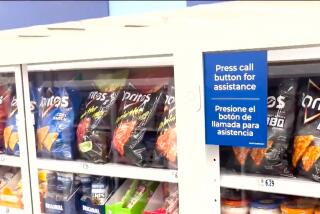Compton, Targeting Drug Dealers, to Ask Businesses to Restrict Pay Phone Use
- Share via
COMPTON — City Council members, in a move similar to those of other Southland cities plagued by drug trafficking, have decided to try to short-circuit the dealers by taking aim at one of their most important tools, the pay telephone.
The council unanimously voted Tuesday to move to persuade private business owners with pay telephones to restrict the phones to outgoing calls.
Compton Police Cmdr. Terry Ebert, explaining that drug dealers set up shop around pay telephones in Laundromats, liquor stores, fast food restaurants and convenience markets and take orders over the phone. “They use the phone booth like an office,” he said.
In Long Beach, where some pay phones have been removed altogether, police estimated last year that as many as three-quarters of all drug deals are arranged on pay telephones. Pay phones have become a popular tool, police say, because calls are hard to trace and because they allow dealers to operate without a permanent address.
Compton’s effort will be modeled after a program started last fall in Inglewood. Compton officials will contact individual business owners and ask them to work with the phone company to restrict pay phones to outgoing calls.
The business owners would continue to receive money from phone companies for housing the pay phones. The phone companies would not suffer financially because they only make money on outgoing calls, officials said.
“We think it will deter a little of the crime,” Councilwoman Bernice Woods said of the city’s plan.
She said business owners probably will welcome the idea. “Businesses are tired of the loafing. It hurts everybody’s business,” she said, adding that potential customers do not stop at stores or restaurants when they see a lot of suspected dealers hanging around.
The council rejected any attempt to remove pay telephones. “In Compton,” Ebert said, “there’s a large number of people who don’t have telephones and need them for emergencies, so we wouldn’t, say, take out the telephones altogether.”
Some communities, such as Long Beach, have removed pay phones in selected neighborhoods. At least nine phones n the West Adams area of Los Angeles were removed at the behest of residents who complained that drug dealers were using the phones for sales.
A Venice resident, outraged because he believed a proliferation of pay phones had turned his neighborhood into a drug supermarket, took an ax to several pay phones.
Compton police have already arranged to have some pay phones moved in order to break up drug sales activity. At Lueders Park on the city’s northside, for example, there was a phone booth outside a liquor store at the edge of the park. When the city built a police substation at the park two years ago, the phone was moved next to the substation door.
More to Read
Sign up for Essential California
The most important California stories and recommendations in your inbox every morning.
You may occasionally receive promotional content from the Los Angeles Times.













